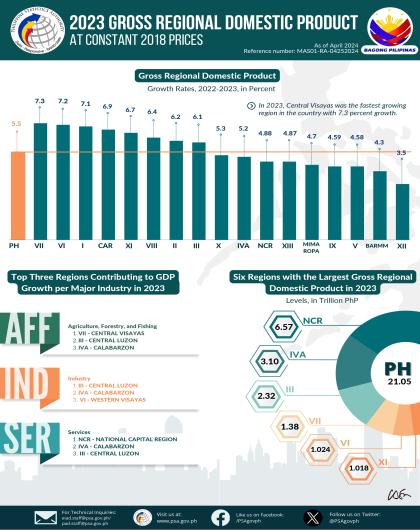Bicol Region’s economy recorded the fastest growth among the country’s 17 regions in 2013. It grew by 9.4 percent in 2013, surpassing its growth of 6.9 percent in 2012. It was followed by: National Capital Region (NCR) with 9.1 percent ; SOCCSKSARGEN, 8.4 percent ; Caraga, 7.8 percent ; and Ilocos Region, 7.7 percent .
On the other hand, the economy of MIMAROPA posted the lowest growth rate at 1.7 percent in 2013, slower than its 4.8 percent in 2012. The Autonomous Region in Muslim Mindanao (ARMM) was second lowest with 3.6 percent in 2013 – an improvement from its 1.1 percent growth in 2012. Western Visayas closely followed with 4.1 percent growth in 2013 which is relatively lower as compared to its 7.7 percent growth in 2012.
Seven regions record accelerated growth
Out of the country’s 17 regions, seven regional economies recorded accelerated growth from 2012 to 2013.
The economy of Eastern Visayas rebounded from a 6.4 percent contraction in 2012 to a growth of 5.7 percent in 2013. Other regions which recorded faster growth in 2013 were: NCR, from 7.0 percent to 9.1 percent ; Cordillera Administrative Region (CAR), from 1.0 to 6.0 percent ; Ilocos, from 5.2 to 7.7 percent ; Bicol, from 6.9 to 9.4 percent ; SOCCSKSARGEN, from 8.0 to 8.4 percent ; and, ARMM, from 1.1 to 3.6 percent .
Zamboanga Peninsula’s economic growth, on the other hand, suffered the biggest deceleration - from a growth of 12.9 percent in 2012 to a 4.3 percent growth in 2013. Other regions that slowed down in 2013 were: Cagayan Valley, from 8.1 to 6.6 percent ; Central Luzon, from 6.5 to 4.3 percent ; CALABARZON, from 7.3 to 6.7 percent ; MIMAROPA, from 4.8 to 1.7 percent ; Western Visayas, from 7.7 to 4.1 percent ; Central Visayas, from 9.4 to 7.4 percent ; Northern Mindanao, from 7.2 to 5.6 percent ; Davao Region, from 7.4 to 6.8 percent ; and, Caraga, from 10.7 to 7.8 percent .
NCR continues to account for the largest share of the national economy
NCR continued to have the largest share of the country’s total economic output with a 36.3 percent share in 2013, slightly higher than its 35.7 percent share in 2012. It was followed by CALABARZON with a share of 17.4 percent and Central Luzon with 9.0 percent . On the other hand, ARMM accounted for the lowest share to the country’s Gross Domestic Product (GDP) at 0.7 percent .
In terms of contribution to the national GDP growth rate of 7.2 percent in 2013, NCR contributed the highest, at 3.2 percent age points; followed by CALABARZON with 1.2 percent age points; and Central Visayas with 0.5 percent age point. On the other hand, ARMM and MIMAROPA had less than 0.1 percent age point contribution.
Real per capita GRDP of NCR nearly three times the national per capita GDP
The average real per capita GDP of the Philippines increased by 5.3 percent or from PhP65,404 in 2012 to PhP68,897 in 2013.
In 2013, NCR posted the highest per capita GRDP at PhP195,806, nearly three times the national average and is 10.5 percent higher than its per capita GRDP in 2012. Aside from NCR, two other regions, CALABARZON and CAR likewise had per capita GRDP higher than the national average at PhP84,657 and PhP76,284, respectively. Meanwhile, ARMM had the lowest per capita GRDP among the regions at PhP14,566.
LISA GRACE S. BERSALES
National Statistician

